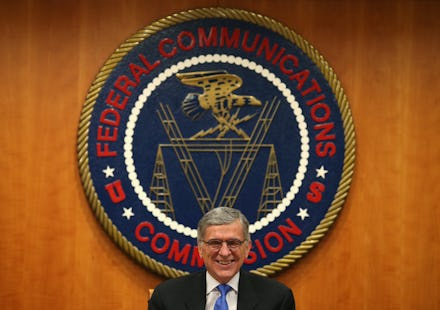Trump's FCC chief Ajit Pai would kill net neutrality. That'd be a disaster for me and you.

Ajit Pai, the senior Republican on the Federal Communications Commission, has been appointed FCC chairman under President Donald Trump. Pai replaces Democrat Tom Wheeler, who resigned last month after serving as chairman for three years.
"I am deeply grateful to the president of the United States for designating me the 34th chairman of the Federal Communications Commission," Pai said in a statement. "I look forward to working with the new administration, my colleagues at the commission, members of Congress and the American public to bring the benefits of the digital age to all Americans."
During his time as a commissioner, Pai has held strong views opposing net neutrality — the principle that internet service providers should give consumers equal access to all legal content and applications without favoring or blocking particular sources — leaving advocates of an open internet concerned about the future.
Under the Obama administration, the FCC reclassified broadband internet as a common carrier under Title II of the Communications Act. Common carriers cannot "make any unjust or unreasonable discrimination in charges, practices, classifications, regulations, facilities or services," the Daily Dot reported. This means ISPs cannot interfere with the internet and its legal content transmission.
Pai opposed this change and even wrote a 67-page dissent statement. Now, after Trump's election, Pai has shared his goals for Title II under the new administration.
"On the day that the Title II [net neutrality] order was adopted, I said that 'I don't know whether this plan will be vacated by a court, reversed by Congress or overturned by a future commission,'" Pai said in a speech before the Free State Foundation in Washington, D.C. "'But I do believe that its days are numbered.' Today, I am more confident than ever that this prediction will come true. And I'm hopeful that beginning next year, our general regulatory approach will be a more sober one that is guided by evidence, sound economic analysis and a good dose of humility."
Those opposed to net neutrality (like cable and telecommunications companies) argue that it's a solution looking for a problem. In his aforementioned speech, Pai claimed "there was no evidence of systemic failure in the internet marketplace" and that Title II's reclassification of broadband internet was "a solution that wouldn't work for a problem that didn't exist." Those in favor of net neutrality make the case that an open internet guarantees paid prioritization will not be an issue and that ISPs cannot throttle or block sources.
By revoking the changes made to net neutrality, the "no blocking, no throttling, no paid prioritization" ruling is eliminated. This means companies could, in theory, block certain content, slow down a user's web experience and offer faster speeds to those willing to pay more. For example, Netflix could hypothetically pay to have its content stream faster than a competitor's. (Note: Netflix is an advocate of net neutrality.)
Pai has been an FCC commissioner since 2012, after receiving a nomination from then-President Barack Obama and being confirmed by the Senate. That said, being appointed by Obama does not mean he shares the same progressive views as the former president. The Verge reported it is "tradition" to give two of the five seats to a minority party, and Pai's nomination came under the recommendation of Republican Majority Leader Mitch McConnell. Under Trump's appointment, Pai will serve as chairman and will need to be reconfirmed by the Senate to serve another five-year term.